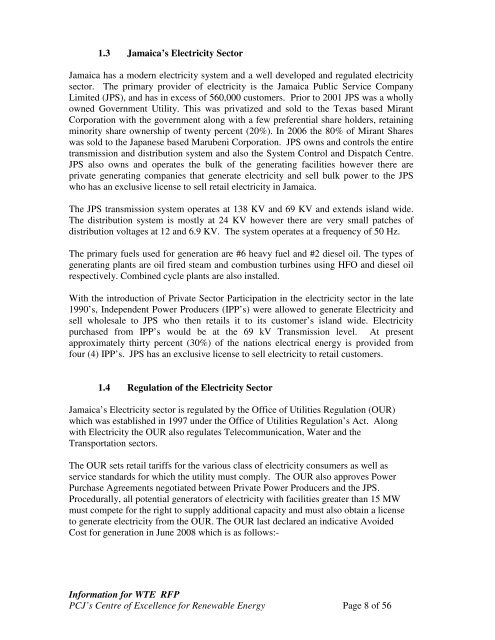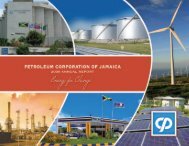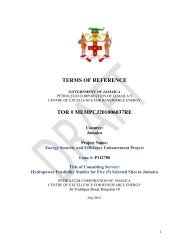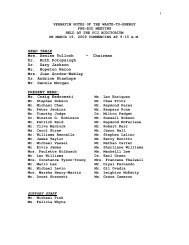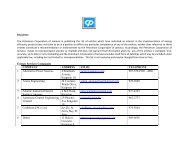Information Doc RFPWTE - Petroleum Corporation Of Jamaica
Information Doc RFPWTE - Petroleum Corporation Of Jamaica
Information Doc RFPWTE - Petroleum Corporation Of Jamaica
You also want an ePaper? Increase the reach of your titles
YUMPU automatically turns print PDFs into web optimized ePapers that Google loves.
1.3 <strong>Jamaica</strong>’s Electricity Sector<br />
<strong>Jamaica</strong> has a modern electricity system and a well developed and regulated electricity<br />
sector. The primary provider of electricity is the <strong>Jamaica</strong> Public Service Company<br />
Limited (JPS), and has in excess of 560,000 customers. Prior to 2001 JPS was a wholly<br />
owned Government Utility. This was privatized and sold to the Texas based Mirant<br />
<strong>Corporation</strong> with the government along with a few preferential share holders, retaining<br />
minority share ownership of twenty percent (20%). In 2006 the 80% of Mirant Shares<br />
was sold to the Japanese based Marubeni <strong>Corporation</strong>. JPS owns and controls the entire<br />
transmission and distribution system and also the System Control and Dispatch Centre.<br />
JPS also owns and operates the bulk of the generating facilities however there are<br />
private generating companies that generate electricity and sell bulk power to the JPS<br />
who has an exclusive license to sell retail electricity in <strong>Jamaica</strong>.<br />
The JPS transmission system operates at 138 KV and 69 KV and extends island wide.<br />
The distribution system is mostly at 24 KV however there are very small patches of<br />
distribution voltages at 12 and 6.9 KV. The system operates at a frequency of 50 Hz.<br />
The primary fuels used for generation are #6 heavy fuel and #2 diesel oil. The types of<br />
generating plants are oil fired steam and combustion turbines using HFO and diesel oil<br />
respectively. Combined cycle plants are also installed.<br />
With the introduction of Private Sector Participation in the electricity sector in the late<br />
1990’s, Independent Power Producers (IPP’s) were allowed to generate Electricity and<br />
sell wholesale to JPS who then retails it to its customer’s island wide. Electricity<br />
purchased from IPP’s would be at the 69 kV Transmission level. At present<br />
approximately thirty percent (30%) of the nations electrical energy is provided from<br />
four (4) IPP’s. JPS has an exclusive license to sell electricity to retail customers.<br />
1.4 Regulation of the Electricity Sector<br />
<strong>Jamaica</strong>’s Electricity sector is regulated by the <strong>Of</strong>fice of Utilities Regulation (OUR)<br />
which was established in 1997 under the <strong>Of</strong>fice of Utilities Regulation’s Act. Along<br />
with Electricity the OUR also regulates Telecommunication, Water and the<br />
Transportation sectors.<br />
The OUR sets retail tariffs for the various class of electricity consumers as well as<br />
service standards for which the utility must comply. The OUR also approves Power<br />
Purchase Agreements negotiated between Private Power Producers and the JPS.<br />
Procedurally, all potential generators of electricity with facilities greater than 15 MW<br />
must compete for the right to supply additional capacity and must also obtain a license<br />
to generate electricity from the OUR. The OUR last declared an indicative Avoided<br />
Cost for generation in June 2008 which is as follows:-<br />
<strong>Information</strong> for WTE RFP<br />
PCJ’s Centre of Excellence for Renewable Energy Page 8 of 56


